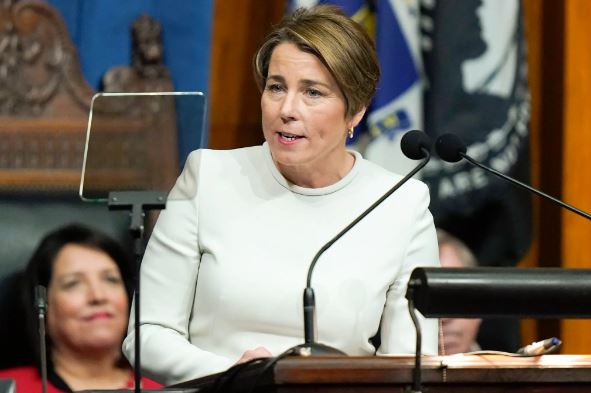The emergency shelter system in Massachusetts is under immense strain, according to Governor Maura Healey, and starting next month, the state will no longer guarantee shelter placements for new arrivals, despite a law stipulating that eligible families must receive temporary housing.
This decision comes after several months of mounting pressure on state officials as an unprecedented surge of migrants, primarily from Haiti, intersects with an ongoing housing crisis. Statewide, nearly 7,000 families, twice the number from a year ago, are currently residing in emergency housing, which includes traditional shelters, hotel rooms, and repurposed college dorms. Approximately half of these families are recent arrivals from other countries.
The number of families seeking shelter is expected to rise to 7,500 by the end of October, and it’s deemed unsafe for the system to expand beyond that point, as stated by Governor Healey, a Democrat. Starting in November, Massachusetts will not add any new shelter beds, and priority will be given to incoming families with health or safety concerns, while others will be placed on waiting lists.
Governor Healey emphasized that the state is not abolishing its 40-year-old right-to-shelter law, the only one of its kind in the nation. The law dictates that pregnant women and families with children who meet income and other criteria must be provided with housing.
It remains unclear how Massachusetts will establish new limitations on emergency shelter while still adhering to its law. Criticism of the law and calls for its modification or repeal have grown since the summer, with some lawmakers supporting a legislative proposal to restrict the right to shelter to U.S. citizens.
State Representative Steven Xiarhos, a Republican from Cape Cod and one of the bill’s sponsors, expressed hope that the governor’s acknowledgment of limited shelter capacity would trigger a serious reevaluation of the right-to-shelter law.
The 7,000 families have been placed in approximately 90 communities across the state, out of a total of 351 cities and towns. Some local leaders have raised concerns that urban areas, which have a higher concentration of hotels and shelters, are disproportionately shouldering the responsibility of providing social services and school placements.
The statewide shelter population totals around 23,000 people, with roughly half being children.
Even under the right-to-shelter law, a significant number of families do not meet the eligibility requirements and are turned away, as reported by Marion Hohn, a senior supervising attorney at Central West Justice Center, which offers legal aid to low-income individuals in central and western Massachusetts.
The state has made efforts to keep up with the influx of new arrivals, engaging service providers, establishing two welcome centers for processing incoming migrants, and securing dormitories and hotels for housing families. However, criticism and concerns have persisted, even in a liberal-leaning, affluent state known for its welcoming attitude.
Governor Healey declared a state of emergency in August, deploying the National Guard to assist in addressing the crisis. She has made numerous appeals to the Biden administration for assistance, including last week when officials from the Department of Homeland Security visited Massachusetts at her request.
In addition to federal funding to secure additional housing, she stressed the state’s need for federal assistance in expediting the processing of work permits for migrants, allowing families to transition more swiftly from reliance on state housing to self-sufficiency.
On Monday, Governor Healey appointed a new emergency assistance director to oversee the state shelter system. To facilitate the transition of shelter residents into the workforce, the state will introduce new job training programs. The state will also collaborate with employers to identify job openings and match them with permitted workers.
She pledged that Massachusetts would remain steadfast in the “next phase” of its efforts. “Massachusetts will continue to rise to this challenge — that is who we are,” she said. “But this is a federal problem that demands a federal solution.”

